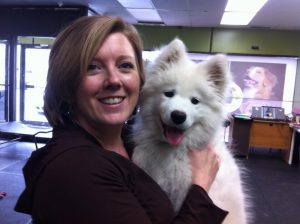CONGRATULATIONS!!! You are expecting. Your life is about the change, baby. And for your dog ? Well, a lot is going to change too! The toys won’t all be his anymore. The noises will be odd and what about those smells ? The hardest change may just be not being the centre of attention anymore.
ROUTINE
Dogs love routine, consistency, yada yada… you know this already. So of course they will notice, that their life is changing. They start noticing way before the baby arrives. Because dogs are so in tune with us, they can notice that our routine is changing. Perhaps you are sleeping more or maybe your work schedule has changed or perchance you are changing things in the home to get ready for baby. All these things can have an impact on rover.
WHAT’S THAT SMELL ?
I believe they notice the smell of pregnancy. Dogs have 250 million more scent receptors than we do (on average) so it only makes sense that they can smell the hormonal changes going on during pregnancy. Everest often came up to my belly to sniff me while I was pregnant. There was a cute moment, when Dominik was just a few days old, where Everest came up to smell my belly, then went over to smell the baby, looked at me and then settled in his favourite spot. I like to think that it was a bit of an “ah ha” moment for him.
TIPS TO PREPARE THE POOCH
there is a lot that you can do to prepare your dog for baby.
You are the centre of your dog’s world. A new baby doesn’t have to upset your canine companion. With a bit of management and training, you can avoid the stress and anxiety a baby can bring into a dog’s life.
When I was pregnant for my son, I had 2 dogs and 1 cat. There were a lot of things that I did before Dominik was born that really made a difference. Practicing basic obedience in various areas in the house was hands down the best thing I did. A sit/stay is really useful when you are changing a gross diaper! A solid “go to your bed” is handy when you are trying to feed a messy eater, or doing tummy time on the floor. I also spent some time teaching the dogs which toys were off limits. Everest is a toy shredder and I suspected that baby would be upset if he found all of his toys ripped and gutted. This was surprisingly easy and I didn’t need to buy TWO of Dominik’s favourite toys just in case 😉
Both dogs adjusted really well to this little furless creature. There was one scary moment, the day our Great Dane Hemingway met the new baby. I had Dominik on the floor and Hemi came by to sniff him. The sniff was very gentle, but then came the big old tennis racket sized paw. Yes, Hemi pawed the kid. Unfortunately, my mother was there and she was horrified… she thought I needed to rehome the dogs. Fortunately, Hemi was so sensitive that our reaction to his pawing was enough to make him never want to do that again. Had he been persistent, unpredictable, snappy and snarly I would not have been as encouraged.
Today, our son is 7 years old. Hemingway passed in August. Everest is now 11 years old. I have my son and Everest’s relationship grow and deepen. It’s moving to watch, and, I like to think, it all started when Dominik was in my womb.







